
..........................................................................................................................................................................................................
...and how did you enjoy the tour, mr smith?
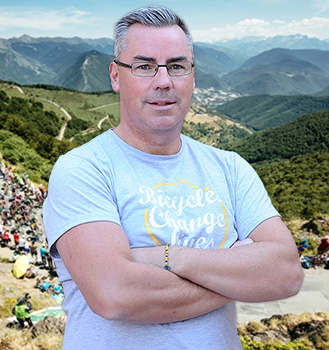
life as a world tour cycle team, though never less than onerous, is one of guaranteed promise. due to the contractual obligations inherent in the designation, though the riders may not have much advance notice as to which race they might be called on to ride, the eighteen teams that make up cycling's premier league know exactly at which races they are required to park the team bus. though this may prove occasionally vacuous for sponsors whose product does not sell in the country of choice, it does mean that essentially, the same teams are racing each other at the same races throughout the season.
thus, for those who like the kind of statistics rolled out at each year's superbowl, there is some sort of order to the upper echelon of professional cycle racing. a particular team can indeed be named as the best, based on its performance throughout the year. the fact that each of the eighteen has competed at the same events, albeit with a different composition of riders, means that, if you'll excuse the metaphor, there is a semblance of a level playing field.
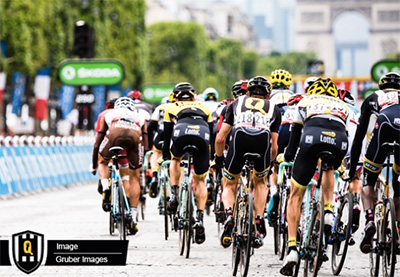
however, the rung below that of world tour is occupied with a reasonable quantity (and quality) of pro-continental teams, these generally exist on a considerably smaller budget than those at the lofty heights and are rarely guaranteed entry to the world's more desirable events such as the spring classics and the three grand tours.
the numbers game dictates that twenty-two teams of nine riders begin the tour de france; subtract the eighteen mentioned above, and that leaves four spaces open for the hopeful, generally drawn from the ranks of the pro-continentals. one of those hopefuls granted a seat at the top table in the recently completed tour de france, was mtn qhubeka, a team registered in south africa and one whose sponsors are a charity dedicated to supplying bicycles to the disadvantaged in their home country. if ever there was an opportunity to shine for such a recently constituted team, this was surely it?
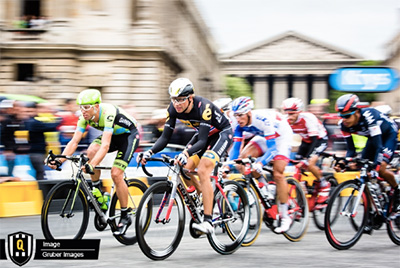
perhaps more necessary for a fledgling team than for those with a larger sponsorship budget is a chap at the top capable of steering a pro-continental team through the punishments and joys of a three week stage race. mtn qhubeka had one of the best for this year's tour de france. twice british road race champion and former motorola professional, brian smith has never ceased to amaze me with his ability to read a race. ever since those early days at cycling tv and latterly with eurosport, brian's ability to note the various team strategies and translate them into the sort of punditry that enhances rather than obscures has been highly impressive. he is also a man i am happy to consider a good friend.
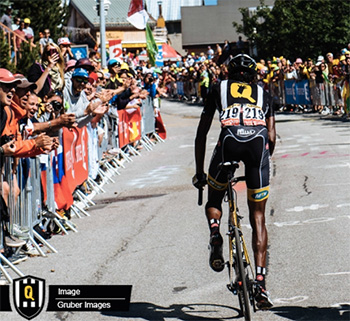
however, orchestrating a tour de france cycle team takes more than a single player; in fact the management structure of even a pro-continental team bears comparison with the similar examples in industry. with a team manager, directeurs sportifs, soigneurs, mechanics et al, not to mention nine riders, there's a lot of people to keep track of. what was brian's function at this year's tour de france?
"My official role with MTN Qhubeka is that of General Manager. This means making sure all areas of the team are working the way they're supposed to and I'm supporting the other managers in their particular areas. There are also important decisions to be made, ensuring we are all moving forward. However, I have a good team of people at MTN Qhubeka, so that helps.
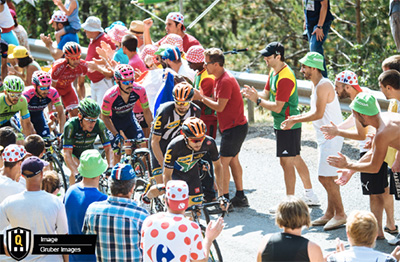 "My role during the Tour de France was as main Sports Director. Having had meetings with the performance team, it was recommended that my experience was required in this important Tour debut. The daily routine worked something like this:
"My role during the Tour de France was as main Sports Director. Having had meetings with the performance team, it was recommended that my experience was required in this important Tour debut. The daily routine worked something like this:
Before: On arriving at the start of the stage I would host a riders' meeting with the other Sports Directors present. This was mostly a briefing on the stage, weather conditions and roles of each rider during the stage. It was also important to keep everyone motivated over the three weeks of the Tour.
 During: I'd inform all the riders of the course and changes in directions, give them info on wind direction and the road layout at key areas of the stage. We had the use of a scouting car ahead of the peloton and a second team car to assist when there was a breakaway. There was also a need to make key tactical decisions with the riders during the stage.
During: I'd inform all the riders of the course and changes in directions, give them info on wind direction and the road layout at key areas of the stage. We had the use of a scouting car ahead of the peloton and a second team car to assist when there was a breakaway. There was also a need to make key tactical decisions with the riders during the stage.
After: I generally finished off by doing my homework on the next day's stage before meeting with the performance team, a debrief of the day, then discuss the next stage. With all this input and information I'd end my day by formulating an exact plan for the following stage.
"I suppose the key element was to make a clear plan and make sure all the riders knew exactly what was expected of them each day."
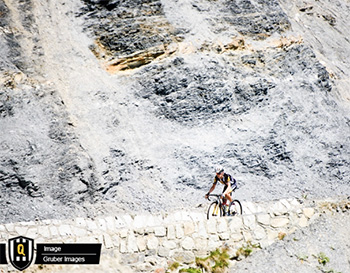
written down in pixels several weeks after the event, though hardly a restful way to spend a day, brian makes it sound a lot simpler than it probably was. after all, the tour de france is renowned as a particularly fast moving target. but it occurred to me that if mr smith had all the above on his hands each day, what was the guy in the team car doing; the fellow we see on the telly handing out sticky bottles to the riders? in other words, how does brian's job differ from that of the directeur sportif.
"A Sports Director micro manages the staff and riders at a particular event while the General Manager oversees every part of the team. The key areas of a team are Performance, Performance Support, Logistics, Service Course, Finance, PR and Media and Partners. Within those areas I have staff members looking after those particular areas. It's my job to make sure all areas, riders and staff are working efficiently."
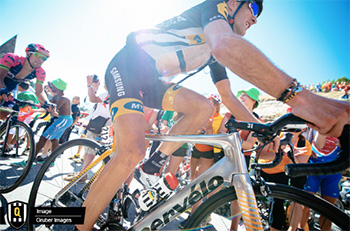
as i made mention above, the world tour teams always have the giro d'italia, the tour de france and la vuelta in their sights every year. it is their guaranteed right. however, mtn qhubeka only found out at the tail end of last year that they'd be filling those three weeks in july with several thousand kilometres of pedalling. so while there's probably a cupboard in team sky's death star containing a big book of tour de france instructions, brian smith and the rest of his team quite likely had to start from scratch. what were the plans for those three weeks?
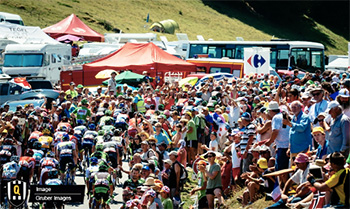
"We set our performance goals back in November last year, namely to win a stage and to wear a competition jersey. We also set goals to raise funds to enable us to donate 5000 bikes to children in Africa by gaining visibility for our charity, Qhubeka. Then we set some individual goals for each rider on the build up to the Tour. The team weren't in every break during the Tour, but they were involved with many of the important ones."
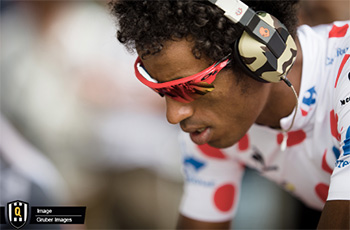
brian and i are both from the same neck of the woods in scotland, a country which features its own national bard in the shape of robert burns. in 1786, burns wrote his poem to a mouse in which there is the celebrated line 'the best laid schemes o' mice an' men, gang aft agley.' translated into english, this means that plans don't always work out the way they were intended to. therefore, though mtn had targeted one of the principal jerseys on offer, was it still something of a surprise that daniel (teklehaimanot) captured the polka dot jersey in the first week?

"Not really, as it was planned. Saying that, it wasn't easy. He was the main man for the breakaway that day and his job was to win all three GPMs. It sounds easy when you say it, but he rode with confidence and commitment before delivering the result we'd asked of him that day."
the crowining glory for any team in the tour de france, other than wearing yellow in paris, is at very least, a stage win. it's something that the world tour teams challenge for almost on a daily basis; for the wild-card entries it's often a prize that dangles tantalisingly just out of reach. however, on stage fourteen, britain's steve cummings outwitted and outpaced a couple of french riders to nab mtn qhubeka's first tour stage win in their first tour. brian's twitter feed (@brismithy) placed the credit for the win squarely on cummings' shoulders. he claimed that it had nothing to do with any advice he may have imparted, stating that cummings was "a man on a mission". was this indicative of the level of individual freedom the riders were allowed, or was it more due to clever teamwork earlier in the stage?

"Steve was our chosen man that day. He was looked after by Eddie Boassen Hagen to help him get in the day's break, though it took a while for the break to establish itself. You can give advice to the riders and ask them to do things, but you can't ride the bike for them.
"Once the break was established, I was happy with the composition. The group was big enough for Steve to duck and dive and with only one rider from MTN, the pressure to ride wasn't on our team as others had several riders in the break. We sent the second team car forward to the break away with clear instructions to give Steve the information he required.
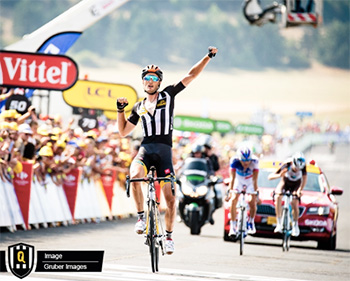 "With the quality of the breakaway, I initially thought Steve needed to look for an opportunity before the final climb. But on seeing the way FDJ were riding, I decided he needed to be patient, saving all his energy for the final climb as the rider with the most power remaining was going to win. Steve is an experienced pro and doesn't need too much encouragement; only the key information delivered at the right time. If you push a rider in the wrong manner, it can have a detrimental effect on their performance. The key element to this particular success was that Steve believed in the team and himself that day. It was a dream come true for both!"
"With the quality of the breakaway, I initially thought Steve needed to look for an opportunity before the final climb. But on seeing the way FDJ were riding, I decided he needed to be patient, saving all his energy for the final climb as the rider with the most power remaining was going to win. Steve is an experienced pro and doesn't need too much encouragement; only the key information delivered at the right time. If you push a rider in the wrong manner, it can have a detrimental effect on their performance. The key element to this particular success was that Steve believed in the team and himself that day. It was a dream come true for both!"
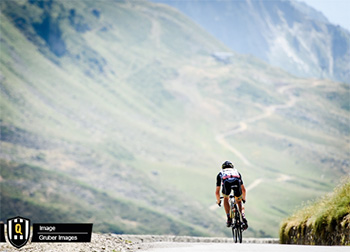
with the possible exception of tommy voeckler's europcar team, tour de france wild-cards have a distinct tendency to be one-off opportunities. and considering the often substantial difference between those at the very top and even those only a few degrees lower in the pecking order, it's a big ask to gain anything from the tour apart from a few collective hours of tv exposure. that's the main reason why you'll usually find at least one wild-card team in each day's doomed breakaway. but the ability to impress is not only centred around tv exposure and keeping the sponsor happy; justifying selection has to be uppermost, perhaps enough to warrant the same opportunity in next year's tour de france. does brian figure that this year's performance will place mtn qhubeka in a good position for a 2016 invite?
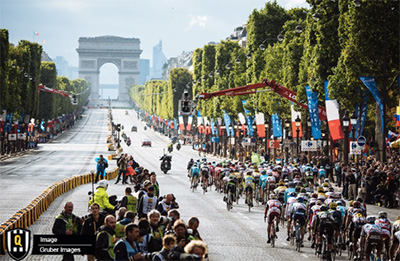
"You would think so, but we won't take this year for granted. We also have a mutual partner with Dimension Data (responsible for some of the on-screen telemetry during this year's tour). We will continue to race the same way we've always done and hope to merit a place in next year's Tour. Everyone on the team loves to race. The ethos of the team will continue in this way."
as one who is apparently completely missing the competitive gene, i've never actually won anything that offered an opportunity or need to celebrate. but several days in the king of the mountains jersey and a stage victory is definitely something worth celebrating. how did the team do so when they reached paris?
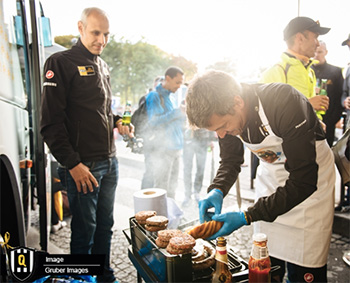
"After the stage we had a BBQ at the team bus with family, friends and partners. Then we went straight to the Elysées Lounge where we had a party planned for 200 guests. I had my own family there so I left earlier to get them to bed. I'm getting a little old now to be partying hard." (no, he's not kidding).
though it's something of a self-fulfilling prophecy, the tour de france has become the biggest cycle race in the world mostly because it has become the biggest cycle race in the world. a bit like the kardashians being famous for being famous. however, there are eleven other months of the year during which plenty of other important and famous races take place. and mtn qhubeka will be showing off their black and white striped jerseys at more than just one or two. what are the plans for the remainder of the 2015 season?
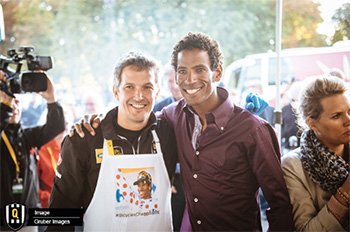
"Our next main goal is La Vuelta. Like the Tour de France we have set a goal of a stage win. We'd also like to look at the Tour of Britain and we have some individual riders looking at the World Championships."
it has to be admitted that for all the spurious comparisons with league football, there is one fundamental difference. just because a team does exceptionally well in the pro-continental ranks doesn't automatically promote them to world tour status. there aren't a couple of world tour teams relegated to pro-continental level, while the latter move up. world tour licences have to be available and applied for, while acceptance depends a great deal on financial status. in other words: sponsorship. does brian have any notion to take mtn qhubeka up to world tour status in the foreseeable future?
"Our target for World Tour is 2017, but if the right partner comes on board for next year then we could step up a year earlier. However, the World Tour has its own demands, so we'll need to evaluate our overall budget before looking at the step upward. But we are moving in the right direction..."
very many thanks to brian smith for his extensive assistance with this feature. i'd also like to send best wishes to matt brammeier of mtn qhubeka who is recovering from extensive injuries sustained in a crash with a service vehicle in the tour of utah.
all photographs are copyright 2015 gruber images.
wednesday 12 august 2015
 ..........................................................................................................................................................................................................
..........................................................................................................................................................................................................